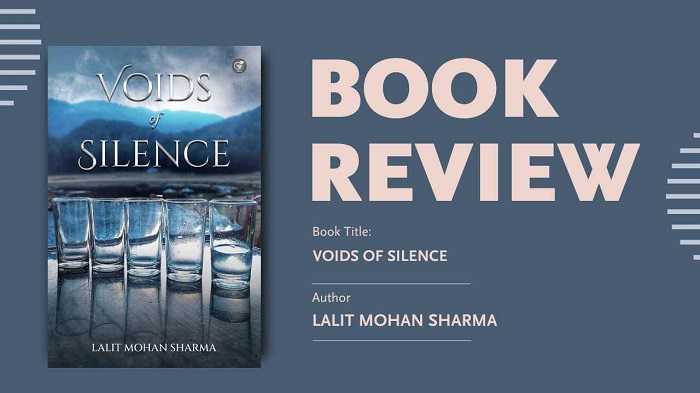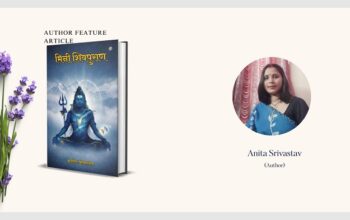In Voids of Silence, Lalit Mohan Sharma presents a collection of poems that echo the meditative rhythm of a seasoned thinker and the acute sensibility of a man deeply attuned to his inner and outer worlds. Published by Astitva Prakashan in 2025, this anthology of seventy-one poems moves effortlessly between the political and the personal, the spiritual and the sensory, the historical and the deeply human. Sharma, a bilingual poet with a formidable academic background, demonstrates once again that poetry is not merely an art form for him, it is a means of self-inquiry, a moral compass, and a mirror held up to a fractured world.
The collection opens with A Doomed Land, a bold and layered meditation on the decay of democracy and the cult of political idolatry. Sharma’s lines carry a restrained anger, the kind that burns quietly beneath the surface. His depiction of a leader who “sits as a sage, talks like a stoic, / At times acts like the court jester” is both scathing and sorrowful. Through this character, he captures the duplicity of modern governance, the spectacle of power masquerading as service. When he writes, “Dissent is disallowed, the discussion / Open in closets, the norm of the times,” it feels like a lament not just for a country but for the human spirit itself. The poem ends with an ironic invocation of “Vasudhaiv Kutumbhkam,” questioning whether humanity still believes in its own universal kinship. It is a searing critique delivered with the precision of philosophy and the tenderness of poetry.
From this outward gaze, Sharma turns introspective in Wilful Divisions, where he explores the psychological and moral boundaries that humans construct around themselves. The poet’s tone softens here, becoming reflective rather than accusatory. He reminds us that borders, whether political or personal, are man-made illusions. His observation that “borders organize, not divide people” speaks to his enduring faith in the universality of experience. The poem carries the wisdom of someone who has witnessed both the glories and follies of civilization, urging readers to rise above the rhetoric of superiority and rediscover the shared pursuit of happiness that binds all living beings.
The collection gains a meta-poetic depth with Words, a piece that stands as Sharma’s quiet manifesto on the act of writing itself. Here, the poet reflects on language as both a tool and a mystery, “Words fall like rain on flowering plains, / Or on the cacti of ancient conundrums.” He treats words as living entities, capable of healing, wounding, provoking, and redeeming. The poem is a meditation on how language bridges consciousness and emotion, and how every word, once uttered, becomes a vessel for human memory. Sharma’s fascination with the power of sound and symbol reveals a poet who regards language as sacred, not as ornamentation, but as revelation. This reverence for words also mirrors the essence of the book’s title: in the “voids of silence,” it is words that take birth, tremble, and find meaning.
Equally thought-provoking is Shades of Abyss, where Sharma descends into the psychological terrains of the self. The poem reads like a dialogue between two aspects of being, the conscious and the shadowed unconscious. The poet acknowledges that each individual is “not just one person but two,” and through that duality he explores the eternal conflict between appearance and essence, light and darkness. The “abyss” here is not a place of despair but of confrontation; it is where truth resides, waiting to be seen. The tone is philosophical yet intimate, suggesting that true self-knowledge is achieved only through a compassionate engagement with one’s own hidden depths. Sharma’s engagement with Jungian ideas of the “inner double” gives the poem an almost mystical undertone, reaffirming his command over both thought and feeling.
While many poems in the collection navigate the crises of identity and civilization, Love Informal offers a tender reprieve, an intimate portrayal of love unbound by artifice or convention. The poet’s voice becomes warmer, gentler, yet just as precise. His description of love as “bright as the hidden gem” captures the quiet resilience of affection that survives beyond youth or romance. What makes this poem memorable is its conversational tone; it reads like an exchange between two souls who have known each other long enough to be comfortable in their silences. There is no grand declaration here, only the delicate hum of companionship, “No need for a diplomacy / Between the loved ones.” The poem restores the reader’s faith in simplicity, in love as a state of being rather than a performance.
Finally, in Voids of Silence, the titular poem, Sharma distills the essence of the entire collection. The poet reflects on the creative process, the moment when “words pause at the threshold” and silence itself becomes fertile. He writes, “Each word is ingrained with colour and / Form, its journey with poets, prophets.” These lines reveal Sharma’s belief that poetry is not an escape from silence but its extension. The void, for him, is not emptiness; it is the womb of all creation. In this poem, he finds a reconciliation between the intellect and the soul, between chaos and order. The silence he speaks of is not absence, but presence, the kind of profound stillness where meaning blooms.
Throughout Voids of Silence, Lalit Mohan Sharma blends lyrical eloquence with moral inquiry. His themes range from nationalism and media to faith, mortality, and love, yet all are connected by a single thread, the quest for truth amid noise. His language is rich but never ornamental; his imagery precise yet evocative. There is a classical restraint in his tone reminiscent of Eliot and a spiritual curiosity akin to Tagore, yet his voice remains distinctively modern, shaped by the anxieties and awakenings of our times.
Reading Voids of Silence is like walking through the mind of a poet who has spent a lifetime observing the world, its follies, its beauty, its contradictions and learning, through silence, to forgive it. Each poem invites the reader to listen, not merely with the mind, but with the quiet spaces within. Sharma’s book is not just a collection of poems; it is a meditation on what it means to be human in an age of distraction, a reminder that even amid noise, the deepest truths still whisper from the voids of silence.



